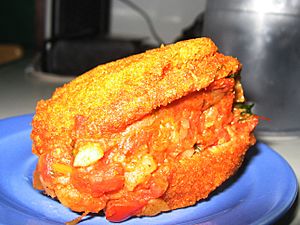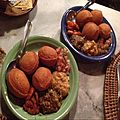Acarajé facts for kids
Acarajé is a super popular street food from Bahia, a state in northeastern Brazil. It's a delicious deep-fried bean cake that has a rich history. This special recipe came to Bahia a long time ago with people from Yorubaland (a region in West Africa, mainly Nigeria) during the time of slavery.
In Nigeria, this dish is called Akara. The women who sell it there often shout "Akara je!" This means "Come and eat Akara!" in the Yoruba language. When freed Yoruba people started selling this food on the streets of Brazil, they used the same call. Brazilians then thought the food itself was called "Acarajé," and the name stuck!
Contents
What is Acarajé?
Acarajé is made from simple, yet flavorful, ingredients. It starts with black-eyed peas, which are ground up with garlic, ginger, and a little salt. This mixture is then deep-fried until golden brown in dendê oil. Dendê oil is a reddish oil that comes from the palm fruit.
How it's Served
Once the bean cake is perfectly fried, it's carefully split in half. Then, it's filled with a variety of delicious toppings. These often include:
- Vatapá: A creamy paste made from bread, shrimp, coconut milk, and palm oil.
- Caruru: A sauce made from okra, dried shrimp, and palm oil.
- Fried shrimp.
- Fresh salad.
- A spicy pepper sauce.
Brazilians added these extra fillings, making their Acarajé a bit different from the Akara found in Nigeria. In Nigeria, the bean cake is usually eaten plain, fried only with palm oil or other vegetable oils, without all the extra fillings.
The Baianas do Acarajé
You'll often find Acarajé being sold on the streets by women known as baianas do acarajé. These women are easy to spot because they wear beautiful traditional clothes. They often have on flowing white dresses, sometimes with colorful turbans on their heads. They might also wear bright necklaces that are connected to the rituals of Candomblé, an Afro-Brazilian religion.
In Nigeria, the women who sell Akara don't have a special ceremony or dress code; they simply wear their everyday clothes. For the baianas in Brazil, selling Acarajé is more than just a job. It's a way of life that helps them support their families and keep their traditions alive.
A Cultural Treasure
Acarajé is much more than just a tasty snack. In 2004, it was officially recognized as an important part of Brazil's cultural heritage in the Bahia region. It's one of the most important symbols of Bahia's rich culture.
Tourists from all over the world love to try Acarajé. They enjoy its unique taste, vibrant colors, and the relaxed way of eating it right on the street. It's a true taste of Brazilian history and tradition!
Images for kids
-
Baiana selling acarajé on the streets of Salvador, Brazil.
See also
 In Spanish: Akara para niños
In Spanish: Akara para niños
 | Bessie Coleman |
 | Spann Watson |
 | Jill E. Brown |
 | Sherman W. White |




